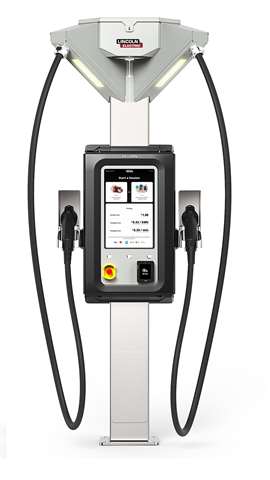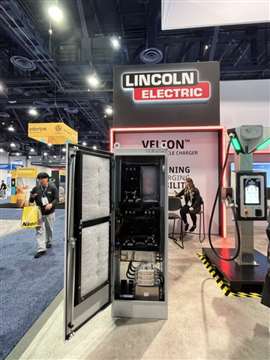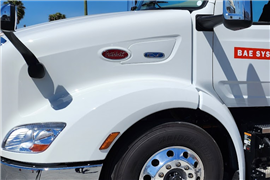Lincoln Electric cites reliability, service as reasons for entering EV charging space
26 February 2024
The company’s Velion DC fast charger is engineered to exceed 97% uptime.
Near the end of 2023, Lincoln Electric introduced the Velion DC fast charger for electric vehicles, a Level 3 DC fast charger platform. The company also exhibited the product at CES 2024. Those familiar with Lincoln Electric as a supplier of welders and welding products might be inclined to ask, “Why are you selling EV chargers?”
“All we’re doing is adding a complementary product to the company’s portfolio,” said Steven Sumner, vice president of corporate innovation for Lincoln Electric.
When charged with exploring new opportunities based upon Lincoln’s core competencies, Sumner said he and his team looked at a variety of vertical markets. Their focus was on ways to apply the company’s ability to manipulate electric current at high power — “We are an AC-to-DC power conversion company,” he said — as well as provide outstanding service. Sumner said EV charging proved an excellent fit.
According to Sumner, Lincoln began looking at EV charging in early 2022. “It was around August 2022 we said, ‘OK, we think we know enough now to actually do something.’ We put some engineers on the project, and then in 90 days we made the charger, which was a proof of concept but 120 kW DC fast charger.”
He added that since then, the company has focused on industrializing the final design with an eye for launching the product — a 150 kW charger — in Q1 2024.
Addressing Charger Reliability
 Lincoln Electric’s Velion DC fast charger. (Photo: Lincoln Electric)
Lincoln Electric’s Velion DC fast charger. (Photo: Lincoln Electric)
One aspect of EV charging Lincoln Electric feels particularly well-suited to address is uptime. When evaluating the EV charging market, Sumner said “the field reliability of what is out there in the market, in our opinion, just isn’t very good.”
Sumner cited an announcement in September 2023 from the U.S. Department of Transportation that $100 million in federal funding will be made available through the Electric Vehicle Charger Reliability and Accessibility Accelerator to “repair and replace existing but non-operational electric vehicle (EV) charging infrastructure.”
He said there were a couple of reasons behind those EV charging systems failures.
“The people that make chargers today — one: their company’s only four or five, six or seven years old, depending upon who you’re talking to,” Sumner said. “Two: they’re taking what I call lab-grade-level stuff — I mean, it’s basic off-the-shelf components that may or may not have the capability of living outside — and stuffing them in a box and expecting it to work.”
By contrast, Sumner said Lincoln Electric’s longevity and experience would contribute to the reliability of the Velion product.
“Our basic approach is, we’ve been doing this for a long time, you know — five decades,” he said. “We know how to make stuff last in the field. We don’t have to reinvent the wheel. Those are proven approaches and proven strategies to make a product last its whole life outdoors, from Dubai to Alaska. We don’t have to learn that.”
In its November 2023 press release, Lincoln Electric said its inaugural 150 kW Velion DC fast charger is engineered to exceed 97% uptime and operate within temperature ranges of -31° to 122°F (-35° to 50°C).
Broad Service Network
Lincoln Electric said another benefit it offers is its factory-trained service network. Michael Peash, sales and business development for Lincoln Electric EV charging, said the company has service centers throughout North America that will be available to service the company’s EV charging systems.
“Downtime has been pretty dismal for EV charging — the reliability factor out there,” he said. “We bring service. We have a three-year parts and service warranty standard with our DC charger, extendable to five years, extendable to 10 years. Other people don’t have that in the equipment that they’re putting out in the field right now.”
 Lincoln Electric showed its Velion DC fast charger at CES 2024. (Photo: KHL Staff)
Lincoln Electric showed its Velion DC fast charger at CES 2024. (Photo: KHL Staff)
Peash added that parts availability is another benefit. “We have a parts warehouse right next door to our facility in Cleveland,” he said. “If we get an order in by 3:00 in the afternoon, it’s out by 5:00 that afternoon for field service.
Serving Many Markets
According to Peash, Lincoln Electric plans to focus on a variety of commercial markets with its Velion charging stations.
“Farm equipment is going to be a huge sector in the electrified marketplace,” he said, adding that throughout his career he had occasion to work with tractor manufacturers on electrifying their equipment. “Charging is going to be a critical point for some of these applications in the farm fields.
“We’re looking down the road with our DC chargers right now to have a battery backup system that could be utilized in an environment out into a farm situation with a solar backup or some other type of grid system where you don’t have to be reliant and do some power sharing between the grid and the battery packs for implementation within construction, farm, mining — mining is a huge marketplace for the EV, also.”
Flexible Distribution
Lincoln Electric said it is being flexible with its distribution strategy.
“It’s very similar to our welding strategy,” Peash said. “We are working with distributors, end users, CPOs — the charge point operators. It could go under the Lincoln brand, it could be white labeled, it could be customized for a CPO or an OEM that wants to bring something special to the marketplace.”
Sumner added that Lincoln would be willing to brand the Velion product for CPOs because the companies main interest is in manufacturing the hardware.
“If they came because they’re buying their hardware in China or Taiwan or South Korea — if they came and wanted Lincoln chargers? Fantastic,” he said. “We would make them. We would brand them.”
Sumner added that Lincoln Electric would take the same approach with commercial vehicle OEMs wanting to put their brand on the charger as well as truck stops seeking to do the same.
Peash said there’s one final aspect of the Velion charging system that seems to appeal to potential customers.
“People like it because we’re made in America,” he said. “We’re completely vertically integrated within Cleveland, and our manufacturing — we’re 75 percent plus domestic content. So we bring a lot to the marketplace that some of our competitors don’t.”
Highlights of the Velion DC fast charger include:
- DC Output Voltage: 200-10000V DC
- DC Output Current: Up to 150A
- DC Output Power: Up to 150 kW
- Input Voltage: 460V AC +/1 10 percent (60Hz), 3 Phase, Protective Earth (UL Model)
STAY CONNECTED




Receive the information you need when you need it through our world-leading magazines, newsletters and daily briefings.
POWER SOURCING GUIDE
The trusted reference and buyer’s guide for 83 years
The original “desktop search engine,” guiding nearly 10,000 users in more than 90 countries it is the primary reference for specifications and details on all the components that go into engine systems.
Visit Now
CONNECT WITH THE TEAM











